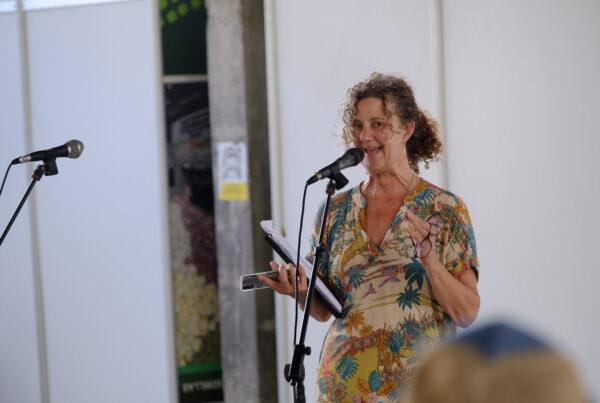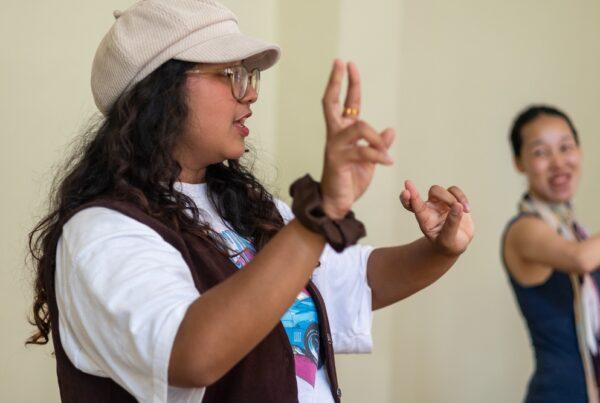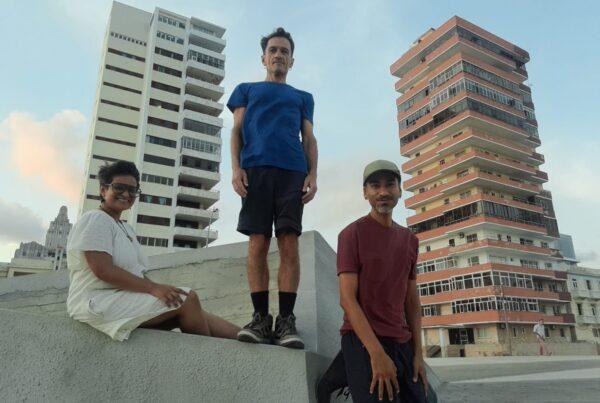Marking the closing of the ASSITEJ Artistic Gathering 2023’s all-day academic and professional conference entitled, ‘The Rights Of Children & Young People To Culture: 10 Years Later’, Professor Wolfgang Schneider, PhD, former UNESCO Chair at the University of Hildesheim, Germany and Honorary President of ASSITEJ, reflected on the day’s rich agenda.
“Part of being a professor is to look at what is said, and find our own way to document it,” said Schneider, in what came across as a heartfelt understanding of the day’s offerings; a rich agenda that instigated a dialogue on the legal and political foundations of the rights of children and young people to culture. Domestic and foreign experts ranging from ombudsman and public institutions to international and domestic organisations for children’s rights, as well as universities, shared their know-how.

Professor Wolfgang Schneider and Diana Kržanić Tepavac
For Schneider, the title ‘The Right of Children & Young People to Culture’ brought about three pertinent questions: What does it mean to have a right for culture, what is the definition of culture, and what kind of performing arts are on the agenda in different cultures when producing theatre for young audiences.
“From these questions, which were discussed in this room from the morning, I have some critical observations,” notes Schneider. Theatre for Young Audiences (TYA) exists between the system of capitalism and the system of education. TYA is mostly defined, or should I say still defined, for these functions to make box offices and to support the curriculum… and this is for the western world obvious again and again,” he adds.
“I also formed some philosophical questions this morning. Could aesthetics find the way into action, could fiction be the impulse for abstractions to create imagination and could the slogan ‘Never violence!’, a vision from Astrid Lindgren, a guideline for the constitution of the performing arts.”

This leads us to some political statements…: Give a wide range of space for participation, promote and produce more co-creation and fight for the one percent of the budget (reference to the scare budget attained for the performing arts in Serbia).
To this end, Schneider brings three final remarks to the table, the first one being the right of children to take part as a process in a long term project. Scheider brings forward his second remark as a question: “These wonderful people have the expertise as suppliers for the process, but why are they not, in the future, the motor of the society with all their knowledge; and last but not least, connect the convention of the United Nations for Children’s rights, to the convention of UNESCO for the diversity of cultural expressions. TYA will then be, once again, more and more intergenerational, international, interdisciplinary.”
Wolfgang worked as Assistant Professor at Frankfurt University, organising two conferences about TYA. In 1989, he founded the Kinder-und Jugendtheaterzentrum in der Bundesrepublik Deutschland. In 1991, the centre continued the work in the former ASSITEJ GDR office in Berlin and has maintained two offices ever since. The same year, he founded the first National Festival for TYA in Germany with the Grips Theater and the Theater an der Parkaue. He established two prizes for TYA, honouring dramatic literature for young people. In 2012, UNESCO appointed him as Chair of Cultural Policy for the Arts in Development.
He was elected to the Board of ASSITEJ Germany (Das Netzwerk der Kinder- und Jugendtheater in Deutschland) in 1986 and served as President from 1997 onwards. In 1991, he established the Archives of ASSITEJ International in Frankfurt. In 1999, he was elected to the ASSITEJ International Executive Committee as Vice President and was then President from 2002-2011. He initiated ‘The ASSITEJ Annual’, a yearbook about TYA in 1996. In 2011, he created a new magazine for ASSITEJ, presented at the 12th ASSITEJ World Congress and Performing Arts Festival for Children & Young People in Copenhagen / Malmö.
Wolfgang Schneider has been President of the European Network of Arts Organisations for Children and Young People, Vice President of the German Federation for Arts Education, Chair of the Advisory Board for Theatre in the State of Lower Saxony, and a member of the Advisory Board for Theatre and Dance in the Goethe Institute. He is an appointed individual member of the German UNESCO Commission and the International Theatre Institute (ITI).
Melissa Hekkers is a freelance journalist and author.
Her most recent book, Amir’s Blue Elephant, a creative non-fiction based on her experiences working in the Moria refugee camp in Lesvos, Greece and Cyprus. In 2018, she launched the My Cyprus Mandala Series, colouring books inspired by the natural and cultural heritage of Cyprus. In 2007, she published her first children’s book in both English and Greek entitled Crocodile, which won the Cyprus State Illustration Award. In 2012, she launched her second children’s book Flying across Red Skies (in English and Greek), using an experimental approach to literature, for which she was nominated for the Cyprus State Literary award. Her third, similarly well-received children’s book was Pupa (Greek and English), published in 2014 and was adapted as a theatre play in 2019. In between her last two books, she published her first free-verse poetry book entitled Come-forth. In 2019 she was contributing author to the anthology Nicosia Beyond Barriers: Voices from a Divided City, published by Saqi Books, London.






